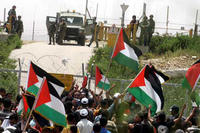-
Lawsuit against DHS contractor grows to $17 million
The lawsuit against private security firm Eagle Technologies Inc. has recently ballooned to more than $17 million; the firm was sued in March 2010 by a dozen current and former employees who provided armed security at the yet to be opened DHS National Biodefense Analysis and Countermeasures Center at Fort Detrick in Frederick, Maryland; the employees accused Eagle Technologies, which was recently purchased by Protection Strategies Inc., of withholding overtime pay, failing to reimburse employees for work-related expenses, and other labor violations; an investigation by the Department of Labor found that the firm had committed sixty-one labor violations
-
-
Oil tankers and refineries on high alert based on latest al Qaeda intelligence
Refineries and ship operators are on a state of heightened alert after documents recovered from the raid on Osama bin Laden’s compound revealed that al Qaeda had considered bombing oil tankers; DHS officials issued the warning to law enforcement officials nationwide based on evidence that al Qaeda operatives had discussed holding drills to practice hijacking and bombing oil tankers to create “an extreme economic crisis” in the United States; port officials and refineries in Houston, Texas are particularly wary, as it is the largest oil producing region in the United States with tankers constantly moving in and out
-
-
Boston tries to bar hazmat trucks from downtown -- again
On average, 317 big trucks and tankers carrying hazardous materials travel through downtown Boston every day; in 2006 Boston had barred hazmat trucks from entering downtown, but federal officials voided the restrictions last year, saying Boston did not show sufficient cause to justify the restrictions; the city commissioned a study on the issue, which recommended diverting hazmat traffic from downtown to a route which will see the truck take the already-congested Route 128, which cuts through Boston’s western suburbs; businesses and cities along the proposed rout object
-
-
DHS announces Preparedness Grants

DHS announced $2.1 billion in preparedness grants to states, urban areas, non-profit agencies, and the private sector; in FY 2011, DHS grants were reduced by $780 million from the FY 2010 enacted level, nearly a quarter of FY 2010 DHS grant funding; the grants focus on the highest risk cities which, according to DHS, continue to face the most significant threats; more than $662 million will go to enhance regional preparedness and capabilities in thirty-one high-threat, high-density areas, and more than $526 million will go to support the implementation of state homeland security strategies to build and strengthen preparedness capabilities
-
-
Analysts question wisdom of DHS spending
As U.S. lawmakers battle to cut the deficit and reduce spending, some are beginning to question if the billions of dollars being poured into counter-terrorism measures are cost effective; in calculating the costs for America’s efforts to combat violent extremism both domestically and abroad, two university professors estimated that the U.S. government spent more than $1 trillion from 2002 to 2011; argues that funds allocated to enhanced security measures are a gross misallocation of resources and that DHS has not conducted proper cost-benefit analysis of projects before spending large sums of money
-
-
Grand Junction, Colorado uses DHS grant to purchase bomb squad equipment
The Grand Junction Police Department in Colorado recently received two grants to purchase sophisticated new equipment for its bomb squad and new information sharing software; on Monday, the city council authorized the police department to accept the two grants; thanks to a $250,000 grant from DHS, the police department will now be able to purchase a Total Containment Vessel (TCV); Grand Junction also received a $108,000 grant from the Colorado Association of Chiefs of Police to purchase new software
-
-
New York firefighters receive $4.2 million to recruit volunteers

Last week the Fireman’s Association of the State of New York (FASNY) announced that it had received a $4.2 million grant from DHS to help recruit and train volunteers; the money comes as part of DHS’ Staffing for Adequate Fire and Emergency Response (SAFER) grant program; FASNY will use the grant money to launch a public awareness campaign with the goal of attracting and maintaining more than 15,000 new volunteer firefighters over the next four years; approximately 75 percent of New York’s firefighters are volunteers, but the state has struggled to attract enough people in recent years
-
-
Researchers tout efficacy of reporting suspicious activity in foiled terror plots
Following the death of Osama bin Laden and with fears of a retaliatory attack on the rise, public policy researchers are touting the efficacy of the new “See Something Say Something” campaign which encourages individuals to report any suspicious activity they see; of the sixty-eight stopped terrorist attacks from 1999 to 2009, nearly 40 percent of the plots were stopped following a report of suspicious activity; critics say that the “See Something Say Something” campaign inundates law enforcement officials with tips that could take valuable time and resources from real investigations
-
-
Palestinians catch Israel, Syria, and Hezbollah by surprise

On 15 May 1948 the State of Israel was born; for Israel this is Independence Day, but for Palestinians the day is naqba (catastrophe in Arabic); this year the naqba commemoration included something new, and perhaps more menacing: hundreds of Palestinians gathered at two spots along the Israeli border, then tried to force their way into Israel; fourteen Palestinians were killed and a few dozens injured in ensuing clashes with the Israeli military; it is easy to accuse the Syrian leadership of allowing the demonstrators to cross into Israel in the hope of inviting an Israeli military reaction which would divert attention from the daily killing of civilians by the Syrian military; it is also plausible to argue that the Iranians, opposing any peace negotiations between the Arab states and Israel, welcomed the clashes along the Israel-Lebanon border; these arguments are plausible, but problematic; the record shows that Syria and Hezbollah have always insisted on complete monopoly over the use of force along their respective borders with Israel
-
-
Texas House prohibits intrusive airport pat downs

The Texas House of Representatives approved a bill that would make invasive pat downs at airports a crime; pat down procedures that would be covered under the measure are inspections that touch the anus, sexual organ, buttocks, or breast of another person including through the clothing, or touches the other person in a manner that would be offensive to a reasonable person; the law would not be enforceable since state legislatures have no authority over federal agencies such as the TSA
-
-
Arlington, Texas hopes to keep aerial drone
The police department of Arlington, Texas is examining ways to fund an unmanned surveillance drone; the drone was originally purchased with grant money from DHS to assist local police officers with security during Super Bowl XLV held at Cowboys Stadium in Arlington last February; the drone is still technically owned its unidentified manufacturer and the City Council is debating how to pay for the drone’s operation and maintenance
-
-
Remote bomb detection sensors
European scientists are embarking on a project to develop a network of state-of-the-art sensors capable of detecting hidden explosives; the sensors will work by detecting the chemical traces of explosive vapors in the air in order to provide early warning to security services and protect vulnerable urban populations from the threat of Improvised Explosive Devices (IEDs), often used by terrorist organizations
-
-
Is the terrorist threat overhyped? -- II
Providing for homeland security is an expensive proposition; government-wide homeland security expenditures grew from about $12 billion in FY2000 to $66 billion in VY2009; DHS budget grew from $33 billion in 2003 to $55 billion in 2010 — an increase of 45 percent after adjusting for inflation; there are indirect costs to homeland security, too: the Office of Management and Budget (OMB) estimates that major homeland security regulations — by “major” OMB means regulations that costs more than $100 a year — cost the U.S. economy between $3.4 and $6.9 billion a year; since not too many Americans have been killed by terrorist acts, the post-9/11 added spending on homeland security means that the United States spends between $63 million and $630 million per one life saved; this an order of magnitude more than what experts, using accepted market measures, would consider the value of a statistical life
-
-
New Jersey launches sophisticated new driver's license

In compliance with Secure ID, the federal law that mandates that states create more stringent identification cards, New Jersey has unveiled a sophisticated new driver’s license; according to New Jersey officials, the new Enhanced Digital Driver’s License puts New Jersey among the ten states with the most secure identity cards; to prevent counterfeiting, security features include an embedded pattern on the license, one and two dimensional bar codes, and “purposeful errors” like misspellings; to implement these new licenses, the state’s MVCs have had to undergo a $19 million upgrade to install new computer systems, hardware, and software
-
-
Is the terrorist threat overhyped?
There are serious people who raise thoughtful questions about the nature and scope of the terrorist threat to Western societies, and because they do not accept the assumptions of both the Bush and Obama administrations about the nature of the threat, they criticize these administrations’ policies; this group of critics of current policies are joined by others who belong to a second group of critics: in this second group we find people who do not share the assessment of members of the first group about the nature of the threat, but who join them in criticizing government anti-terror policies as too expensive, to intrusive, and ineffective; a new, thought-provoking article on the subject performs a useful service in that it should keep advocates of expensive and intrusive government anti-terrorism policies honest
-
More headlines
The long view
Factories First: Winning the Drone War Before It Starts
Wars are won by factories before they are won on the battlefield,Martin C. Feldmann writes, noting that the United States lacks the manufacturing depth for the coming drone age. Rectifying this situation “will take far more than procurement tweaks,” Feldmann writes. “It demands a national-level, wartime-scale industrial mobilization.”
No Nation Is an Island: The Dangers of Modern U.S. Isolationism
The resurgence of isolationist sentiment in American politics is understandable but misguided. While the desire to refocus on domestic renewal is justified, retreating from the world will not bring the security, prosperity, or sovereignty that its proponents promise. On the contrary, it invites instability, diminishes U.S. influence, and erodes the democratic order the U.S. helped forge.
Fragmented by Design: USAID’s Dismantling and the Future of American Foreign Aid
The Trump administration launched an aggressive restructuring of U.S. foreign aid, effectively dismantling the United States Agency for International Development (USAID). The humanitarian and geopolitical fallout of the demise of USAID includes shuttered clinics, destroyed food aid, and China’s growing influence in the global south. This new era of American soft power will determine how, and whether, the U.S. continues to lead in global development.
Water Wars: A Historic Agreement Between Mexico and US Is Ramping Up Border Tension
As climate change drives rising temperatures and changes in rainfall, Mexico and the US are in the middle of a conflict over water, putting an additional strain on their relationship. Partly due to constant droughts, Mexico has struggled to maintain its water deliveries for much of the last 25 years, deliveries to which it is obligated by a 1944 water-sharing agreement between the two countries.
How Disastrous Was the Trump-Putin Meeting?
In Alaska, Trump got played by Putin. Therefore, Steven Pifer writes, the European leaders and Zelensky have to “diplomatically offer suggestions to walk Trump back from a position that he does not appear to understand would be bad for Ukraine, bad for Europe, and bad for American interests. And they have to do so without setting off an explosion that could disrupt U.S.-Ukrainian and U.S.-European relations—all to the delight of Putin and the Kremlin.”
How Male Grievance Fuels Radicalization and Extremist Violence
Social extremism is evolving in reach and form. While traditional racial supremacy ideologies remain, contemporary movements are now often fueled by something more personal and emotionally resonant: male grievance.
